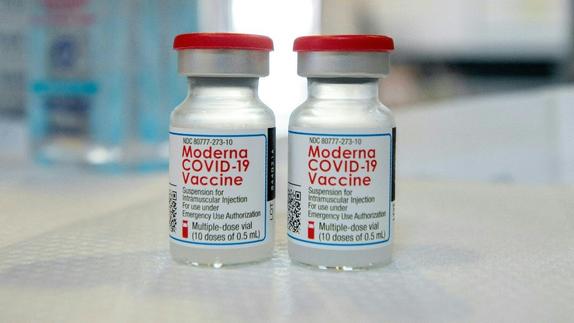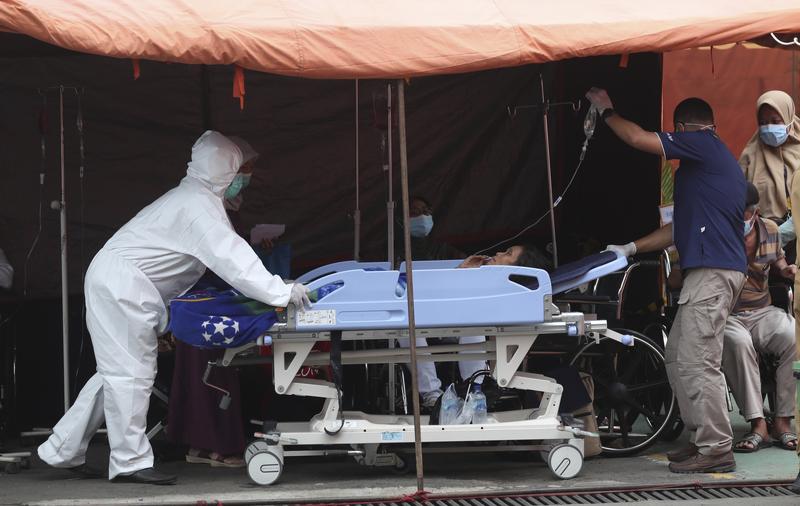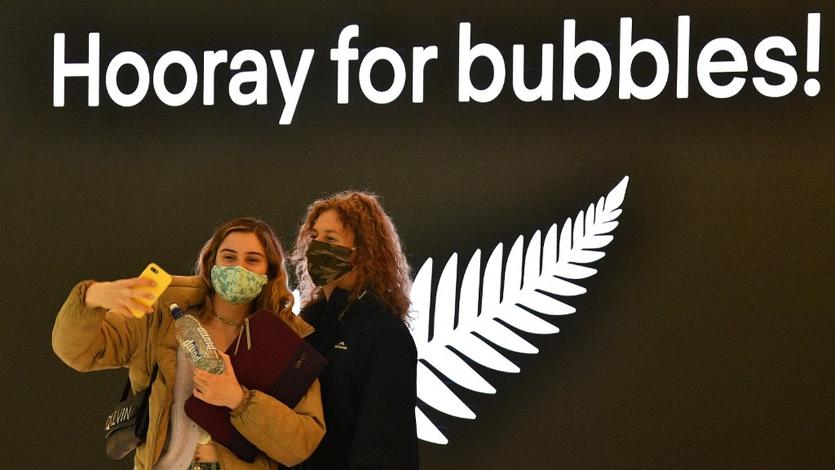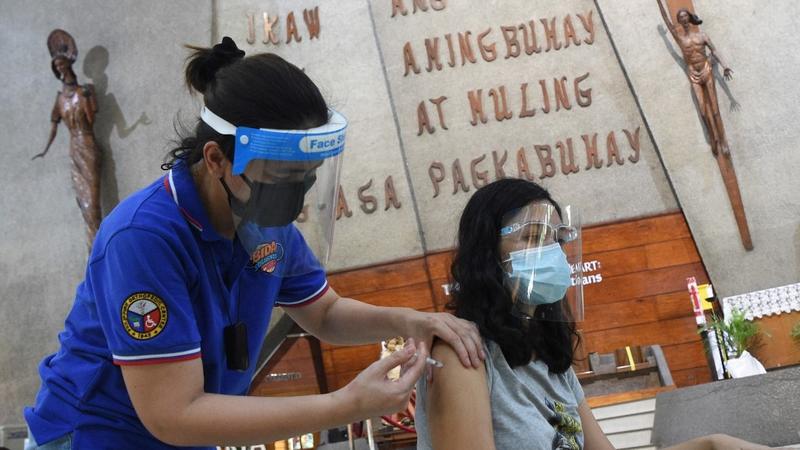 In this photo Moderna vials sit on a table before they are loaded into syringes at a mobile COVID-19 vaccination clinic, run by Hartford Healthcare at Saint Charles Borromeo Catholic Church's McGivney community center, in Bridgeport, Connecticut on April 20, 2021. (PHOTO / AFP)
In this photo Moderna vials sit on a table before they are loaded into syringes at a mobile COVID-19 vaccination clinic, run by Hartford Healthcare at Saint Charles Borromeo Catholic Church's McGivney community center, in Bridgeport, Connecticut on April 20, 2021. (PHOTO / AFP)
WELLINGTON / JERUSALEM / YANGON / SINGAPORE / TEHRAN / JAKARTA / NEW DELHI / PHNOM PENH / ANKARA / SUVA / SYDNEY / BENGALURU / CANBERRA / SEOUL / ULAN BATOR / HANOI / MANILA - India's Cipla Ltd has been granted a new drug permission for restricted use of Moderna Inc's COVID-19 vaccine in the country, a senior government official said on Tuesday.
India added 37,566 new COVID-19 cases Tuesday, the lowest one-day surge since March 18 which was just before the deadly second wave hit the South Asian nation. The overall tally of coronavirus infections is now just a little over 30 million, making it the world’s second-largest outbreak after the US.
As many as 329 million vaccine doses have been administered so far as the government races to curb a possible third wave amid the discovery of a new mutation of the highly-transmissible delta variant.
A senior official said on Monday that at least half of Mumbai's under-18s have been exposed to COVID-19 and have antibodies against it, raising some hopes for levels of protection in that age group.
The figures came from a government survey in India's financial capital conducted from April to mid-June, when the country was in the middle of a devastating second wave of the disease that left thousands dead.
"This is good news because it shows that at least half the population below 18 is protected from COVID-19, but we will make sure that we don't let our guard down," Suresh Kakani, Mumbai's Additional Municipal Commissioner who oversaw the survey, said.
An estimated 1.5 million of Mumbai's 12.8 million population are younger than 18, and none of them have been vaccinated as India has not approved any shots for children, he said.
Pakistan
Pakistan continued to report major decreases in the number of daily COVID-19 cases as 735 people contracted the virus over the last 24 hours, the National Command and Operation Center (NCOC) said Tuesday.
The figure marked the lowest number of daily new cases since Oct. 25 last year when 707 confirmed cases were recorded in a single day.
The NCOC, the department leading Pakistan's campaign against the pandemic, said the total tally of confirmed cases of COVID-19 has risen to 956,392 in the country, including 901,985 recoveries.
According to the NCOC, 23 more patients lost their lives to the coronavirus epidemic over the last 24 hours, raising the overall death toll to 22,254.
Pakistan's eastern Punjab province is the worst-hit region with 346,036 infections, followed by the southern Sindh province which reported 336,507 infections in total.
Australia
Australia reported a slight rise in COVID-19 infections on Tuesday, while officials in several states tightened movement curbs and pushed for vaccinations to limit flare-ups of the highly infectious Delta variant.
After months in which it had nearly stamped out the virus, Australia is battling the variant in five of its eight states and territories, just two weeks after an infection in key city Sydney involving a limousine driver of overseas airline crew.
Worries that the variant first detected in India could touch off outbreaks have forced lockdowns in three large cities and curbs of varying strictness in several more, affecting more than 20 million Australians, or about 80 percent of the population.
Northern Queensland state imposed a three-day lockdown in capital Brisbane and neighbouring regions from Tuesday evening. The Western Australian capital of Perth began a four-day lockdown from Tuesday, joining Sydney and Darwin.
Sydney, home to a fifth of Australia's population, is in a two-week lockdown until July 9, while a stay-home order in the outback city of Darwin was extended by 72 hours to Friday. The Sydney outbreak has grown to nearly 150 cases.
Mandatory masks and limits on gatherings are among the curbs across Australia.
Also, Monday's decision to indemnify doctors who give the AstraZeneca vaccine to those younger than 60, a bid to kickstart a sluggish inoculation program, provoked complaints from doctors who said the medical regulator still recommended the vaccine for those older than 60.
Omar Khorshid, the president of the Australian Medical Association, said the change took him by surprise and caused "disagreement and confusion", by appearing to contradict the formal advice.
Public health experts in three states said they were not consulted before the announcement.
Cambodia
Cambodia on Tuesday confirmed 723 new COVID-19 cases, pushing the national caseload to 49,255, the Ministry of Health (MoH) said in a statement.
The new infections included 625 local cases and 98 imported cases, the ministry said.
Nineteen more fatalities had been reported, bringing the overall death toll to 575, the ministry said, adding that 709 patients recovered, raising the total number of recoveries to 43,473.
Cambodian Prime Minister Samdech Techo Hun Sen said Monday that 4 million people in the Southeast Asian country have received at least one dose of COVID-19 vaccine so far.
So Soy, a 65-year-old disabled veteran from southwestern Koh Kong province, was the 4 millionth person to be vaccinated, Hun Sen wrote on his Facebook page, adding that he awarded the man 10 million riels (US$2,500) for being the special recipient.
Cambodia began a vaccination drive on Feb 10, starting from capital Phnom Penh and Kandal province before expanding it to Preah Sihanouk, Koh Kong, Kampong Speu, Svay Rieng and Takeo provinces last week.
The country has three vaccines approved for emergency use so far, namely China's Sinopharm and Sinovac and Britain's AstraZeneca.
Fiji
At the Qauia settlement, a community of more than 2,000 near Fiji's capital of Suva, police stand guard to ensure no one other than health workers comes in - or out - of an area that has become a hotspot of COVID-19 infections.
After keeping the coronavirus at bay last year, Fiji, with a population of about 900,000, is now recording as many as 300 new cases a day as part of a wave of infections linked to the highly transmissible Delta strain, a variant first detected in India.
The spread has been rampant in the Pacific island's close-knit settlements, with Qauia representing the fastest-growing cluster, according to health authorities.
Although the total number of infections in Qauia is not public, the settlement recorded 153 cases in a single day last week, according to official data. Fiji has recorded just over 3,500 infections and 13 deaths during the second wave starting in April.
The outbreak has been linked to a breach in a quarantine facility.
The containment of settlements, including Qauia, is part of a broader plan to suppress the virus, with schools closed and a curfew in place across the usually bustling nation, where tourism accounted for about 40 percent of its gross domestic product before the pandemic.
Like most Pacific island nations, Fiji closed its borders in the early stages of the pandemic. Now it is one of a small but growing number such nations battling increased infections, along with Papua New Guinea. read more
About 46 percent of Fijians have received at least one dose of AstraZeneca or Sinopharm vaccines, according to official data, while just over 6 percent have received a second.
Indonesia
Indonesia's COVID-19 surge is on the edge of a "catastrophe" as the more infectious Delta variant dominates transmission and chokes hospitals in Southeast Asia's worst epidemic, the Red Cross said on Tuesday.
Indonesia has reported record daily COVID-19 infections of more than 20,000 in recent days, in a new wave of infections fueled by the emergence of highly transmissible virus variants and increased mobility after the Muslim fasting month.
"Every day we are seeing this Delta variant driving Indonesia closer to the edge of a COVID-19 catastrophe," said Jan Gelfand, head of the Indonesian delegation of the International Federation of Red Cross and Red Crescent Societies (IFRC), urging better vaccine access globally.
Hospitals in several designated "red zone" areas have reported overcapacity, including the capital Jakarta, with its isolation beds 93 percent occupied as of Sunday.
"Hospitals are full because of the case surge caused by mobility and loosening health protocol adherence, worsened also by the Delta variant," said senior health ministry official Siti Nadia Tarmizi, when asked about the IFRC's assessment.
Indonesia will start offering COVID-19 vaccination to those aged 12 to 17 years old, after last week extending the inoculation to all adults in order to curb a worsening virus resurgence.
“The food and drug regulator has issued an emergency use of authorization for Sinovac vaccine to be applied on teens,” President Joko Widodo said in a press briefing on Monday.
Jokowi, as the president is known, has set a target of administering 1 million doses a day.
On Monday, only about 377,000 shots were given, down from about 700,000 a day last week. The daily target will double to 2 million shots a day starting in August, Jokowi said.
ALSO READ: Indonesia to start vaccinating teens to curb virus resurgence
 Medical workers carry a woman on stretcher from an emergency tent erected to accommodate a surge of COVID-19 patients at a hospital in Bekasi, West Java, Indonesia on June 28, 2021. (ACHMAD IBRAHIM / AP)
Medical workers carry a woman on stretcher from an emergency tent erected to accommodate a surge of COVID-19 patients at a hospital in Bekasi, West Java, Indonesia on June 28, 2021. (ACHMAD IBRAHIM / AP)
Iran
Iran on Monday reported 12,351 new COVID-19 cases, taking the country's total infections to 3,180,042.
The pandemic has so far claimed 83,985 lives in Iran, up by 140 in the past 24 hours, the Iranian Ministry of Health and Medical Education reported.
Israel
The number of active COVID-19 cases in Israel rose to 1,425, the highest since May 1, said the ministry of health on Monday.
It reported 296 new coronavirus cases, raising the total infections in the country to 841,184. The death toll from the virus increased to 6,430 with one new fatality, while the number of patients in serious condition decreased from 23 to 21.
The number of people vaccinated against COVID-19 in Israel has reached nearly 5.56 million, or 59.6 percent of its total population.
Earlier in the day, a new rule imposing a fine of 5,000 new shekels (US$1,534) on those who return from countries defined "with the highest COVID-19 risk" took effect in Israel. These countries are currently Argentina, Brazil, India, South Africa, Mexico and Russia.
Japan
Tokyo reported 476 confirmed cases on Tuesday, as new infections continue to tick up in the Japanese capital with less than a month to go before the scheduled start of the Olympic Games. The 7-day average of new cases is now 22 percent higher than what it was a week ago.
Although the Olympics are set to go ahead with domestic spectators capped at 10,000 guests, or 50 percent of venue capacity, that decision could be scrapped if serious COVID-19 cases increase and the medical system becomes strained. Jiji reported that Tokyo will suspend part of the Olympic Torch relay due to start July 9 in the outskirts of the city because of concern about the virus spread.
Malaysia
Malaysia unveiled a 150 billion ringgit (US$36 billion) package to help people through a nationwide lockdown that was extended for a second time with COVID-19 infections still elevated.
The plan includes a 10 billion ringgit direct fiscal injection and will result in the government disbursing 10 billion ringgit in cash aid to the people by the end of the year, Prime Minister Muhyiddin Yassin said on Monday. The announcement marks the fourth stimulus package announced by the government this year.
Mongolia
Mongolia reported 1,727 new cases of COVID-19, and 15 more deaths from the virus, taking the national counts to 113,232 and 567 respectively, the country's health ministry said Tuesday.
A total of 9,085 samples were tested across the country in the past day, and the latest confirmed cases were local infections, said the ministry.
Myanmar
Myanmar reported 1,225 new COVID-19 cases Monday, bringing the total cases in the country to 154,385, according to a release from the Ministry of Health and Sports.
A total of 12 more deaths were reported on Monday, bringing the death toll to 3,309, the release said.
 Travelers take selfies before their departure for New Zealand at Sydney International Airport on April 19, 2021. (SAEED KHAN / AFP)
Travelers take selfies before their departure for New Zealand at Sydney International Airport on April 19, 2021. (SAEED KHAN / AFP)
New Zealand
New Zealand said on Tuesday it will partially resume quarantine-free travel with Australia and remove all COVID-19 curbs in place in Wellington as no community cases were reported in the capital city after over a week of restrictions.
Quarantine-free travel will resume with South Australia, ACT, Tasmania and Victoria from July 5, COVID-19 Response Minister Chris Hipkins told a news conference.
Coronavirus restrictions in Wellington will be eased from midnight on Tuesday, Hipkins said.
The pause on travel from New South Wales, Queensland, Northern Territory and Western Australia remains, and will be reviewed on July 6.
Also, a new report on wellbeing statistics suggests that, while the COVID-19 pandemic has had a major impact on the country, New Zealanders have remained resilient, Stats NZ said on Tuesday.
The data showed that while there were some small changes, most New Zealanders remained satisfied with their lives overall and continued to find the things they do in life worthwhile.
"However, some groups were less likely to be satisfied with their lives. These included unemployed people and sole parents, amongst others," wellbeing and housing statistics manager Claire Bretherton said in a statement.
From the September 2020 quarter onwards, Stats NZ also collected data on happiness. When asked to rate how happy they felt the previous day, the proportion of New Zealanders who gave a high score of 7 or above out of 10 was over 80 percent in each of the three quarters, Bretherton said
New Zealand reported four cases of COVID-19 in managed isolation and no cases in the community on Tuesday
Singapore
Singaporean officials identified five new local coronavirus cases, staying within range of the previous day’s figures, as the government speeds up its vaccination program.
All cases detected were linked to earlier infections, government data showed on Tuesday. Five imported cases were found and had already been placed under quarantine. The day before, the Health Ministry reported four local infections, all of which were connected to earlier cases.
Singapore is set to accelerate the pace of vaccinations as part of a phased reopening plan. In a Facebook post earlier today, which has since been removed, Health Minister Ong Ye Kung said that authorities will be opening up vaccination bookings for non-citizens tomorrow, two days ahead of what was initially planned.
ALSO READ: India's cases rise by more than 50,000 amid variant concerns
South Korea
South Korea plans to secure more mRNA vaccines against COVID-19 to use them as a booster shot next year for its entire population, Prime Minister Kim Boo-kyum said on Tuesday.
South Korea has already agreed to buy 106 million doses of mRNA vaccines from Pfizer and Moderna to cover full vaccination of its population of 52 million this year.
The government is also hoping to achieve herd immunity earlier than its November target by inoculating at least 70 percent of its population with a minimum of one vaccine dose.
Kim also said it was necessary to broaden the age group of people eligible for vaccination to ensure students can safely return to schools in the autumn amid the spread of more infectious variants. It is also unclear how long immunity protection lasts on those people who have already been vaccinated.
The government has approved the use of the Pfizer vaccine on 16-year olds and above, while the Moderna shot can be given to those aged 18 and older.
South Korea's large manufacturing employers have received permission from the country's health authorities to administer COVID-19 vaccines at in-house clinics, hoping to speed up inoculation of their employees.
The inoculation plans come amid the South Korean government's push to ramp up vaccinations after a slow start. South Korea has inoculated 15.3 million people, or about 30 percent of its population, with at least one dose since it began administering vaccines in February.
Affiliates of the country's biggest conglomerate Samsung Group, including Samsung Electronics Co Ltd, Samsung Display and Samsung SDI Co Ltd, plan to offer vaccine doses to employees at work next month, the companies said on Tuesday.
South Korea reported 595 more cases of COVID-19 as of midnight Monday compared to 24 hours ago, raising the total number of infections to 156,167.
Two more deaths were confirmed, leaving the death toll at 2,017.
Thailand
Thailand will limit the movement of foreign tourists to smaller islands that it’s initially throwing open to vaccinated foreign visitors in the event of a flareup in local coronavirus infections, a minister said.
Phuket, Samui and Phi Phi - among the first places to welcome inoculated tourists without quarantine before a wider national reopening - are all smaller islands and will allow authorities to quickly curb movement if community transmission spikes, Minister of Tourism and Sports Phiphat Ratchakitprakarn said. He ruled out the closing of borders to combat any virus clusters stemming from the reopening.
 A health worker inoculates a resident with a dose of the AstraZeneca/Oxford COVID-19 vaccine inside a Catholic church turned into a vaccination centre in Manila on May 21, 2021. (PHOTO / AFP)
A health worker inoculates a resident with a dose of the AstraZeneca/Oxford COVID-19 vaccine inside a Catholic church turned into a vaccination centre in Manila on May 21, 2021. (PHOTO / AFP)
The Philippines
The Philippines maintained the travel ban for all inbound travelers from India, Pakistan, Sri Lanka, Bangladesh, Nepal, Oman, and the United Arab Emirates (UAE) until July 15, presidential spokesperson Harry Roque said on Tuesday.
The Philippines has detected the more transmissible Delta variants in the samples taken from 17 returning Filipinos, among whom a seafarer has died, the Department of Health of the Philippines said
President Rodrigo Duterte has prolonged restrictions on movement and businesses in the Philippine capital and nearby provinces until mid-July, and retained stricter COVID-19 curbs in central and southern areas, an official said on Tuesday.
Infections in the capital region, home to at least 13 million people, have dropped since peaking in April, but some provinces are battling spikes as the country scrambles to distribute and administer vaccines.
Entertainment venues, amusement parks, and contacts sports are prohibited in the capital region and nearby provinces, while restaurants, gyms and indoor tourist attractions are allowed to operate at up to 40 percent capacity.
But 21 cities and provinces outside the capital remain under tighter measures to contain the virus.
Also, the Philippines will receive one million doses of AstraZeneca COVID-19 vaccines next month provided by Japan, its ambassador to the Southeast Asian nation said on Tuesday.
“We are working double time so this donation reaches Philippine shores without delay,” the ambassador posted on his official Twitter account posted. The vaccines will be delivered on July 8.
The Philippines' Department of Health (DOH) reported on Tuesday 4,479 new COVID-19 infections, bringing the total number of confirmed cases in the Southeast Asian country to 1,408,058.
The death toll climbed to 24,557 after 101 more patients died from the viral disease, the DOH said, adding that 14 laboratories failed to submit data.
Turkey
Turkey on Monday confirmed 5,283 new COVID-19 cases, including 431 symptomatic ones, raising the total number of cases in the country to 5,414,310, according to its health ministry.
The death toll from the virus in Turkey rose by 58 to 49,634, while the total recoveries climbed to 5,280,558 after 5,327 more recovered in the last 24 hours.
UAE
Abu Dhabi, the capital of the United Arab Emirates, will restrict access to some public places like schools and restaurants unless people are vaccinated. It takes effect from Aug 20.
The Abu Dhabi media office said the decision came after 93 percent of target groups had been vaccinated. It covers shopping centers, restaurants, recreational facilities, resorts, nurseries, schools and universities. Children under 15 are exempt.
Vietnam
Vietnam's health ministry said in a statement on Tuesday it had approved Moderna Inc's COVID-19 vaccine for emergency use, making it the country's fifth vaccine to be approved as authorities seek to accelerate an inoculation programme.
Vietnam has previously approved the AstraZeneca vaccine, Russia's Sputnik V, China's Sinopharm vaccine and the Pfizer/BioNTech vaccine.
Also, Vietnam can gradually resume regular international flights by year-end as the rollout of COVID-19 vaccines accelerates domestically and globally, VietnamPlus news website reported, citing a report sent to Ministry of Transport by the country’s Civil Aviation Authority.
Vietnam’s economic hub of Ho Chi Minh City will maintain COVID-19 social distancing measures for an undetermined time starting Tuesday amid a growing coronavirus outbreak across the metropolis, newspaper Tuoi Tre reported, citing Deputy Mayor Duong Anh Duc at a Monday press conference.
Ho Chi Minh City, which began its anti-virus measures May 31, reported 3,492 local virus cases as of this morning out of the nationwide tally of 12,736 patients from late April, according to data from the health ministry.
Restrictions include shuttering of establishments from gyms to karaoke bars and restricting public transportation, ride-sharing services and taxis


